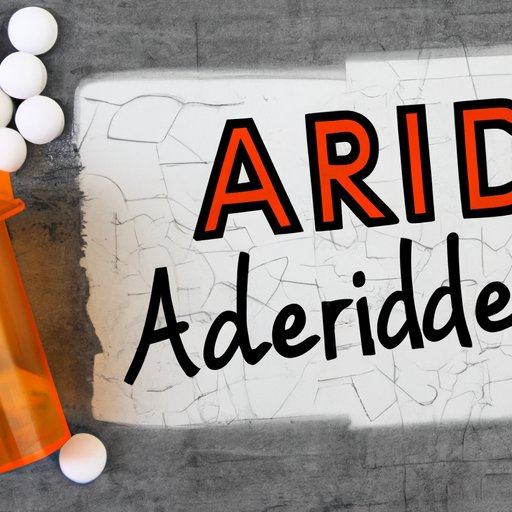Introduction
Adderall is a prescription medication that is commonly used to treat Attention Deficit Hyperactivity Disorder (ADHD). It is a combination of two stimulants – amphetamine and dextroamphetamine – which work together to increase levels of dopamine and norepinephrine in the brain. These two neurotransmitters are thought to play a role in regulating attention and focus, making them key targets for ADHD treatment.
This article will provide an overview of how Adderall works in the brain and its effects on cognitive performance. We will also examine the potential side effects of Adderall use and explore alternatives to Adderall for treating ADHD.
The Neurochemical Effects of Adderall on the Brain
Adderall works by increasing levels of dopamine and norepinephrine in the brain. Dopamine is a neurotransmitter associated with pleasure, motivation, attention, and movement, while norepinephrine is involved in alertness and arousal. By increasing levels of these neurotransmitters, Adderall can improve focus and concentration, reduce impulsivity, and increase energy levels.
The exact mechanism by which Adderall works is not fully understood, but it is thought to involve both direct and indirect actions. The direct action involves binding to specific receptors in the brain to increase levels of dopamine and norepinephrine. The indirect action involves blocking the reuptake of these neurotransmitters, which increases their presence in the brain.
By increasing levels of dopamine and norepinephrine, Adderall can improve cognitive performance, allowing people with ADHD to better focus, concentrate, and stay organized. It also helps to reduce hyperactivity and impulsivity, allowing people to better control their behavior.

How Adderall Impacts Cognitive Performance
Adderall has been shown to have a positive effect on cognitive performance. Studies have found that when taken at low doses, Adderall can improve working memory and executive functioning, such as planning and decision-making. It can also improve verbal fluency, information processing speed, and reaction time.
At higher doses, however, Adderall can have negative effects on cognition. Research has found that taking high doses of Adderall can lead to decreased performance on tasks that require sustained attention and increased fatigue. It can also impair learning and memory, leading to poorer academic performance.

Exploring the Potential Side Effects of Adderall Use
Although Adderall can be beneficial for people with ADHD, it can also have potential side effects. Common side effects include headache, dry mouth, insomnia, loss of appetite, nausea, and dizziness. More serious side effects include heart palpitations, suicidal thoughts, and psychosis.
There is also evidence linking Adderall use to mental health problems. Studies have found that people who take Adderall are more likely to experience depression and anxiety. Additionally, there is a risk of substance abuse, as Adderall is a stimulant and can be habit-forming.
Investigating the Link Between Adderall Use and Mental Health
It is important to note that the link between Adderall use and mental health problems is still being studied. While there is evidence that suggests a connection, it is not clear if this is due to the drug itself or other factors, such as pre-existing mental health issues or lifestyle habits.
It is also important to remember that Adderall is a powerful drug and should not be used without consulting a doctor. People who take Adderall should be monitored closely for any signs of adverse effects and should not take more than the recommended dose.

Exploring Alternatives to Adderall for ADHD Treatment
For those who do not want to take Adderall, there are several alternatives available. Non-stimulant medications, such as bupropion and atomoxetine, can be used to treat ADHD. Additionally, behavioral therapy and lifestyle modifications, such as exercise and diet changes, can help to improve symptoms of ADHD.
Conclusion
Adderall is a powerful drug that can be beneficial for people with ADHD. It works by increasing levels of dopamine and norepinephrine in the brain, which can improve focus and concentration. However, it can also have potential side effects, including mental health problems and addiction. For those who do not wish to take Adderall, there are alternatives available, such as non-stimulant medications and behavioral therapy.
In conclusion, Adderall can be an effective treatment for ADHD, but it is important to be aware of the potential risks and side effects. It is always best to consult with a doctor before taking any medication and to weigh all of the pros and cons before deciding what is best for you.
(Note: Is this article not meeting your expectations? Do you have knowledge or insights to share? Unlock new opportunities and expand your reach by joining our authors team. Click Registration to join us and share your expertise with our readers.)
